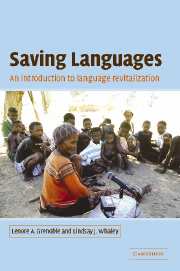6 - Orthography
Published online by Cambridge University Press: 04 December 2009
Summary
Introduction
The decision to include local literacy as part of a language revitalization effort often entails the creation of a written form of the language, either because no such form has ever existed or because it has fallen into disuse, as noted in Chapter 5. In this chapter, we move to what is perhaps the chief consideration in standardizing language, the development of an orthography. Though some of the same general issues mentioned in the previous chapter are also relevant to orthography development and will need to be revisited, we have opted to devote a separate chapter to orthographies for two main reasons. First, since the creation of symbols to encode a spoken language is a precondition for any literacy in that language, many people involved in nascent language revitalization efforts find themselves confronted with the practical questions of how to go about creating an effective orthography. They have decided to make the first steps towards developing literacy in a local language, but are unsure of how to create materials for reading and writing. Second, most of the available resources on language revitalization do not contain more than cursory discussions about orthography (Hinton and Hale 2001 is a notable exception), even though they identify local literacy as a commonly desired aim of revitalization efforts.
One of the most important aspects of orthography development is the recognition that, beyond purely linguistic considerations, there are a range of social, psychological, economic, political, and historical issues involved in making decisions about how to write a language.
- Type
- Chapter
- Information
- Saving LanguagesAn Introduction to Language Revitalization, pp. 137 - 159Publisher: Cambridge University PressPrint publication year: 2005



